



Seattle Aquarium
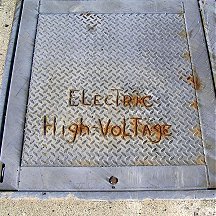 A doorway to another world, another place, another time.
A doorway to another world, another place, another time.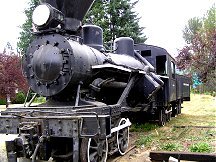 No hiking today. We pack up camp after breakfast. We walk to the river to retire our walking sticks gathered two days prior. We ceremoniously throw them into the rapids from the footbridge.
No hiking today. We pack up camp after breakfast. We walk to the river to retire our walking sticks gathered two days prior. We ceremoniously throw them into the rapids from the footbridge. The wife, the child, and I hike from White River campground to Glacier Basin. The view of The Mountain from this basin is spectacular: forest, meadow, river, rock, basalt cliffs, sun, puffs of clouds that assemble and spin and quickly dissipate. We thank God for being here to see this because we almost didn't make it.
The wife, the child, and I hike from White River campground to Glacier Basin. The view of The Mountain from this basin is spectacular: forest, meadow, river, rock, basalt cliffs, sun, puffs of clouds that assemble and spin and quickly dissipate. We thank God for being here to see this because we almost didn't make it. Tonight, the child, the wife, and I are retiring to our sleeping bags in our three-man tent in our campsite of White River Campground of Mount Rainier National Park. The fire has just been extinguished and the sky is filled with thousands of visible stars, most of which cannot be seen from our home due to the lights of suburban and urban living that washout the night sky. Our bellies are full of hotdogs and baked beans. This meal was chosen by the child, who in her toddler mind, thought this would be good food for the evening. It was.
Tonight, the child, the wife, and I are retiring to our sleeping bags in our three-man tent in our campsite of White River Campground of Mount Rainier National Park. The fire has just been extinguished and the sky is filled with thousands of visible stars, most of which cannot be seen from our home due to the lights of suburban and urban living that washout the night sky. Our bellies are full of hotdogs and baked beans. This meal was chosen by the child, who in her toddler mind, thought this would be good food for the evening. It was. "I saw in [the] eyes [of neighbors who came to visit] something I was to see over and over in every part of the nation—a burning desire to go, to move, to get under way, anyplace, away from any Here."
"I saw in [the] eyes [of neighbors who came to visit] something I was to see over and over in every part of the nation—a burning desire to go, to move, to get under way, anyplace, away from any Here."The article by Ted Conover, "Capitalist Roaders," captures some of the excitement of a culture that is just beginning to really discover individual ownership of automobiles. There is a new middle class emerging in China that is changing the way that China views itself. Subsequently, freeways and highways are being built across China to ensure the growth of car ownership and ease, for some, of moving about the country. Conover traveled with members of the Beijing Target Auto Club as they drove a circuitous route from Beijing to Hubei Province and back, with stops at the recently completed Three Gorges Dam on the Yangtze River and Shennongjia, an UNESCO biosphere reserve. Most of their journey, however, is spent in their cars, on the roads, oftentimes for twelve or more hours each day.
Conover captures some of the thrill and excitement of a burgeoning car culture, while pondering what that culture will look like in the near future. China will soon have the most miles of roads for a single nation, second only to the United States, and then will quickly surpass even that number. China's need for petroleum to fuel the cars, as well as for the asphalt, will speed up the depletion of global oil resources, and has already dramatically increased air pollution. There is also the question of how the world's largest communist country will embrace the capitalism that underlies the car culture. McDonald's is already in partnership with China's state-run petroleum giant Sinopec. The plan is to build filling stations that include drive-thru McDonald's restaurants along major highways and freeways. Will China's road system soon resemble that of the United States?
The question of what the United States road system looks like, and how it influences other aspects of our culture and our lives is examined in the article by Robert Sullivan. In the first of four examinations, he looks at the automobile infrastructure of New England. As he states in his opening paragraph: "The roads—and the routes and the paths, the trails and the rights-of-way—take us away and they bring us home. They make us who we are and they make the places where we live."
These two sentences are at the heart of what Ted Conover is expressing about China's new car culture and its auto clubs; are what Robert Sullivan's explorations are based upon; are what John Steinbeck was attempting to discover in his travels with Charley; and are the flavor of Joan Ockman's beautiful prose poem about wandering about in her car.
What intrigues me, in addition to the consistent flavor that runs through all three of the articles and Steinbeck's book, is Sullivan's conversations with people whose professions are to think about driving and its effects upon us. He talks with both Dolores Hayden, a professor of architecture and author of the book A Field Guide to Sprawl, and with Andy Wiley-Schwartz, vice-president for transportation of Project for Public Places. Their conversations with Sullivan help to really solidify his argument that roads "make us who we are and they make the places where we live."
While reading the Sullivan article, the myriad of images already in my mind from Ockman's piece, the Conover article, and Steinbeck's book, as well as the photographs that accompany the Sullivan article, collided with one another to create some huge "accident" or "traffic jam" in my mind. My thoughts kept slowing down like traffic in New York City or Beijing or Seattle, which was not necessarily a bad thing, since it allowed for more intense focus and reflection upon what car culture means for me, and for you. One of Matthew Monteith's photographs is of the side of a McDonald's restaurant with the prevalent image of a Big Mac and the words "Super Size It!" The caption below the photograph reads "McDonald's, I-95, Connecticut." But, it could easily read "McDonald's drive-thru at Sinopec gasoline station, Chinese Freeway, Hubei Province."
What will our cars make us? What will they make the places where we live? Will they help us to rediscover who we are? As Steinbeck laments before he sets off on his journey across the United States: "I had not heard the speech of America, smelled the grass and trees and sewage, seen its hills and water, its color and quality of light. I knew the changes only from books and newspapers." Steinbeck did get out of his car, though, in order to hear and smell and see; I have just been reading books, magazines, and newspapers. Perhaps I need to go for a drive.
---
I also find it interesting that Robert Sullivan's article in Dwell is sponsored and underwritten by Saturn. Why is a car company supporting an article on how cars affect our lives? As the Dwell introduction to the article proclaims: "With the generous support of Saturn, who shares our mobile fascination..."
So, I figured that this post should also be sponsored by a car, although without the knowledge of the car's maker. If Dwell undergirds its article with a relationship to a particular brand of automobile, then surely I can express my own bias toward the Smart car, which is coming soon to the United States. See what Europeans have been enjoying for the past few years at www.smartusa.com.
Economical. Environmentally friendly. Safe. SMART.
 The child and I wandered around a bookstore this evening. It was fun to watch her as she bounced from book to book, aisle to aisle, giggling and chattering.
The child and I wandered around a bookstore this evening. It was fun to watch her as she bounced from book to book, aisle to aisle, giggling and chattering.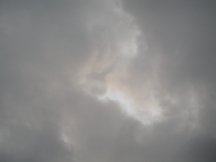 "These are not joyful times. These are challenging times. These are difficult times."
"These are not joyful times. These are challenging times. These are difficult times."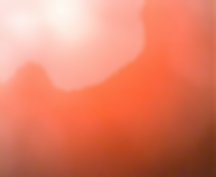 "Do you suffer what a French paleontologist called 'the distress that makes human wills founder daily under the crushing number of living things and stars'? For the world is as glorious as ever, and exalting, but for credibility's sake let's start with the bad news."
"Do you suffer what a French paleontologist called 'the distress that makes human wills founder daily under the crushing number of living things and stars'? For the world is as glorious as ever, and exalting, but for credibility's sake let's start with the bad news."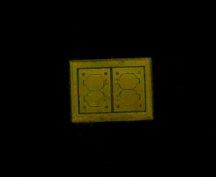 A covert operation.
A covert operation.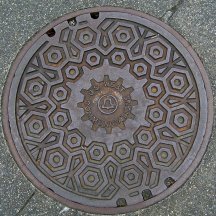 This one is a beauty.
This one is a beauty.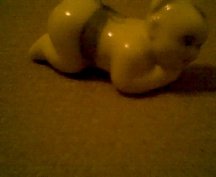 Perhaps my outlook on life is too dour. The child and I were playing in my "nostalgia box" this evening. It is filled with an assortment of clutter—old birthday cards, my high school and college graduation caps, Cub Scout arm bands and neckerchiefs, crappy poems I wrote in 1988, and various toys. The child was intrigued by the toys, and, truth be told, so was I. Pretty soon we had various tops, a gyroscope, a miniature Slinky, and a magnifying glass scattered about the kitchen floor.
Perhaps my outlook on life is too dour. The child and I were playing in my "nostalgia box" this evening. It is filled with an assortment of clutter—old birthday cards, my high school and college graduation caps, Cub Scout arm bands and neckerchiefs, crappy poems I wrote in 1988, and various toys. The child was intrigued by the toys, and, truth be told, so was I. Pretty soon we had various tops, a gyroscope, a miniature Slinky, and a magnifying glass scattered about the kitchen floor.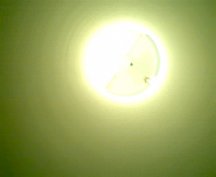 "Free my mind, levitate/Don't let any of those f***ers in my headspace."
"Free my mind, levitate/Don't let any of those f***ers in my headspace."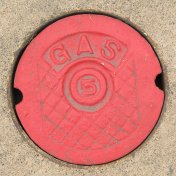
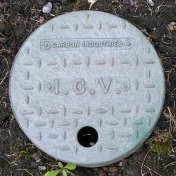
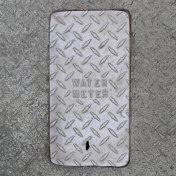
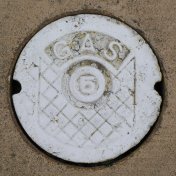
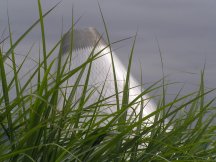 When I hear people speak of deja vu I think that they must not have really experienced what they were doing either time! The child and I visited Tacoma again today. We wandered the same areas that we visited two weeks ago. This was partly to get photographs of some of the architectural pieces and works of public art in the Museum District that intrigue me. Two weeks ago, the keychain camera we were using "dumped" the photographs we took and almost all of them were lost. This time we took the keychain camera and the wife's digital camera to ensure that we would "capture" the things we photographed again.
When I hear people speak of deja vu I think that they must not have really experienced what they were doing either time! The child and I visited Tacoma again today. We wandered the same areas that we visited two weeks ago. This was partly to get photographs of some of the architectural pieces and works of public art in the Museum District that intrigue me. Two weeks ago, the keychain camera we were using "dumped" the photographs we took and almost all of them were lost. This time we took the keychain camera and the wife's digital camera to ensure that we would "capture" the things we photographed again.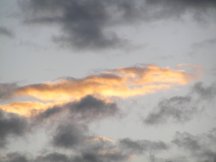 The evening is quiet. There are no wanderings tonight. Only games with the child. Feeding babies with bottles. Feeding monkeys "mushy-mush." Camping with frogs, turtles, chickens.
The evening is quiet. There are no wanderings tonight. Only games with the child. Feeding babies with bottles. Feeding monkeys "mushy-mush." Camping with frogs, turtles, chickens. I dream of Yucca Mountain National Nuclear Repository. The desert is aflame.
The Woman labors and grunts. The Dream of 1862 is reborn in this wasteland: an iron leviathan, rather than The Child, snakes forth, hauling its poisonous cargo toward the waiting maw of the mountain's tunnel. Leviathan rumbles through Caliente Canyon and Murphy Gap, ever closer to the North Portal. It trundles on rails anchored in boulders prematurely crushed and ground into gravel, clacking along over creosote-soaked timbers.
I hear the ghosts of timber barons singing, chanting. The ghoulish inside traders and venture capitalists of yesterday's tomorrow harmonize. I hear the moans of Nevada as she suffers at court, the judiciary in collusion with the priests of legislature and the executive. We never talk anymore, these places and times erased from our lives. The birds disappear, go silent. We do not notice when their singing ends.
These names are scrawled on City in the desert: Union Pacific Railroad, Central Pacific Railroad, Southern Pacific Railroad, Northern Pacific Railway, Great Northern Railroad. They are the words that make leviathan's entry possible. From Sacramento, Seattle, Topeka, St. Paul, Omaha, New Orleans, Chicago, New York it comes: the food to feed this five-headed hydra, this monstrosity of iron and wood and coal. The food to propel it deep into the heart of the earth.
The earth cries out. I can hear it speaking to me in the middle of the night. Unlike us, it speaks sweetly, succinctly. I listen attentively. I nod off. I awake again. This is fever I tell myself. You do not stir.
The desert is aflame and I am small. I do nothing because it feels right, comfortable. I speak to no one. I know nothing.
I am quiet, compelled to keep to myself.
The Woman cries out from the edge of City. I hear her panting. A monster is being born.




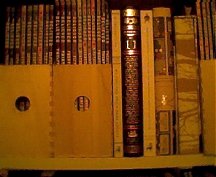 Well, I have finally hit the big time. I feel like a rock star with his own groupie. Why, you ask? Because I have my own public reader.
Well, I have finally hit the big time. I feel like a rock star with his own groupie. Why, you ask? Because I have my own public reader.
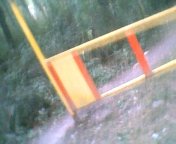
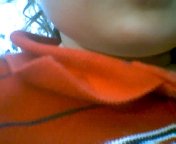


My wanderings with the child have been pleasant in their own right. I imagine that this is how most of life should be: somewhat aimless, with no real goal, all the while enjoying the scenery and experiences and events and people along the way. There has been no expectation on my part that anything has to happen. Today, however, it did.
The child and I took our weekly walk to the Puyallup Farmers Market. It usually entails stopping in at the library, playing on the slides and swings in the park, sometimes purchasing some local produce or bread, and looking at a few booths. We usually head out in the morning and are back home for lunch by noon. On this trip, I decided we would take lunch so that the child could play in the public wading pool when it opened. After she "swam," we went searching for something to be the anchor of my meal, which in this case meant a chili dog. As we headed over to the food booths to obtain the aforementioned chili dog, I noticed that there was to be a poetry reading in the park. Considering that the poetry reading was in the park and in Puyallup, I figured we might sit for a few minutes and go home. But, the headliner for the event was Marvin Bell, one of my favorite poets whom I have had the pleasure of hearing read before.
So, the child and I ate our lunch while the opener, a high school student whose name I forget (sorry), read three well-written poems. Next, while Boyd Benson, a poet who teaches English at Washington State University read for 20 or so minutes, the child decided to take a nap in her stroller, albeit with a noisy beginnings to her slumber. I walked out of the range of other audience members, so they could not hear the child, and started pushing the stroller back and forth across the park. She fell asleep in time for me to regain a seat close to hear Marvin Bell read.
It was wonderful. He read some old poems, he read some newer poems, and he read some poems from a forthcoming book to be published in July 2007. He read one of my favorite poems he has written, "White Clover." His newer poetry was about war and dreams, especially the dream that our nation has fallen into during this current war in Iraq. It was exactly what I feel political poetry should be about: subtle rather than blunt, challenging without being overly accusatory, personal while speaking to all. This was definitely "payoff" for all of my wanderings, even though a "payoff" was not necessary.
Afterwards, I went home and grabbed my volumes of Bell's poetry off of my library shelves. The inscription inside my copy of Poetry for a Midsummer's Night, which includes "White Clover," reads: To Troy - with much pleasure - Marvin Bell - 6 August 1998 - Open Books. That was eight years ago tomorrow.
I cannot make this stuff up.
I should also mention that the poetry reading was presented by River and Sound Review, a non-profit that is affiliated with Valley Arts United. Valley Arts always seems to be an organization on the brink of collapse; their website hasn't been completely updated in over two years. However, River and Sound Review seems to be of a higher caliber than what normally passes for Valley Arts affiliates. River and Sound Review did a good job of hosting and also had two literary games involving audience members between the readings. I was impressed enough to add myself to their email list.
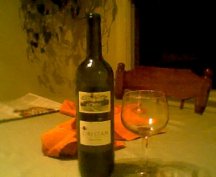 Last night, we had friends over for dinner. This dinner was part of a series of Christmas gifts to coworkers and friends. The idea was for the wife and I to work on our hospitality. We had taken a spiritual gifts inventory at our church a few years ago and on a scale of 0 to 5, 0 being least hospitable and 5 being most hospitable, I scored a zero! Therefore, I had some work to do, and figured that during the process of improvement we would get to have some good meals, with good drink, in good company.
Last night, we had friends over for dinner. This dinner was part of a series of Christmas gifts to coworkers and friends. The idea was for the wife and I to work on our hospitality. We had taken a spiritual gifts inventory at our church a few years ago and on a scale of 0 to 5, 0 being least hospitable and 5 being most hospitable, I scored a zero! Therefore, I had some work to do, and figured that during the process of improvement we would get to have some good meals, with good drink, in good company.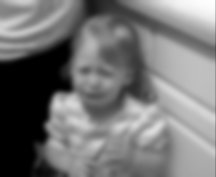 What is all the uproar over the photographs in the exhibit End Times by Jill Greenberg? Is it really child abuse like some loud-mouthed bloggers, and right-wing pundits, are claiming? Is it art?
What is all the uproar over the photographs in the exhibit End Times by Jill Greenberg? Is it really child abuse like some loud-mouthed bloggers, and right-wing pundits, are claiming? Is it art? “In order to come out with a species, it takes an enormous amount of work, let’s call it, with lots of waste, and lots of abortions, and so on. But once an organism is defined, then that living organism, every living organism, is a model of frugality, of leanness.”
“In order to come out with a species, it takes an enormous amount of work, let’s call it, with lots of waste, and lots of abortions, and so on. But once an organism is defined, then that living organism, every living organism, is a model of frugality, of leanness.”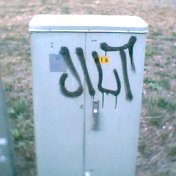
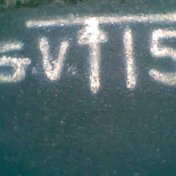
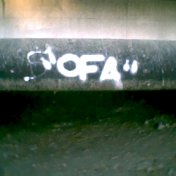

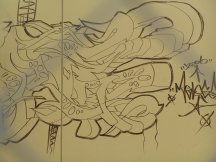 "Merge" done by The Wonderful Alien.
"Merge" done by The Wonderful Alien.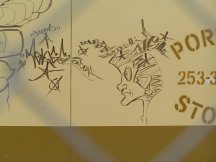 few days earlier without the graffiti. The dumpster sits one block north and two blocks east of the Puyallup police station. It also sits behind a six foot high chainlink fence directly beneath a streetlight in a work area that often has workers on site late into the evening. The dumpster faces the street, Pioneer Avenue, one of the most travelled streets in downtown Puyallup, and one frequented with police cruisers passing by on Pioneer to and from the station. The art is not necessarily executed as well as some other graffiti art I have seen, but The Wonderful Alien must have some big cojones!
few days earlier without the graffiti. The dumpster sits one block north and two blocks east of the Puyallup police station. It also sits behind a six foot high chainlink fence directly beneath a streetlight in a work area that often has workers on site late into the evening. The dumpster faces the street, Pioneer Avenue, one of the most travelled streets in downtown Puyallup, and one frequented with police cruisers passing by on Pioneer to and from the station. The art is not necessarily executed as well as some other graffiti art I have seen, but The Wonderful Alien must have some big cojones!